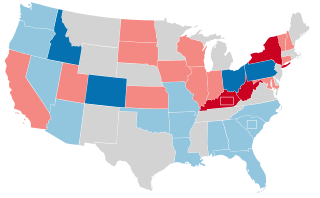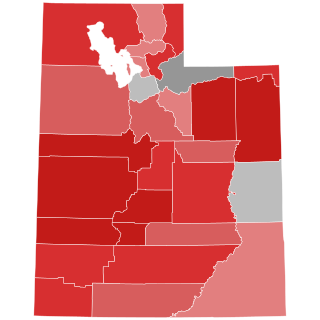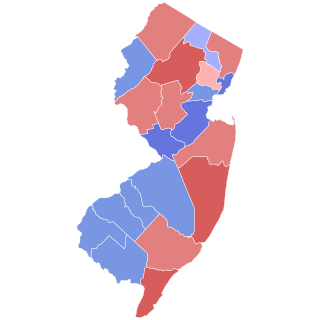
Frank Edward "Ted" Moss was an American lawyer and politician. A Democrat, from 1959 to 1977 he served as a United States Senator from Utah, and is currently the last Democrat to do so.

The 1976 United States Senate elections was an election for the United States Senate. Held on November 2, the 33 seats of Class 1 were contested in regular elections. They coincided with Democrat Jimmy Carter's presidential election and the United States Bicentennial celebration. Although almost half of the seats decided in this election changed parties, Carter's narrow victory did not provide coattails for the Democratic Party. Each party flipped seven Senate seats, although, one of the seats flipped by Democrats was previously held by a Conservative.

The 1958 United States Senate elections were elections for the United States Senate which occurred in the middle of President Dwight D. Eisenhower's second term. Thirty-two seats of Class 1 were contested in regular elections, the new state of Alaska held its first Senate elections for its Class 2 and 3 seats, and two special elections were held to fill vacancies.

The 1956 United States Senate elections were elections for the United States Senate that coincided with the re-election of President Dwight D. Eisenhower. The 32 seats of Class 3 were contested in regular elections, and three special elections were held to fill vacancies. Although Democrats gained two seats in regular elections, the Republicans gained two seats in special elections, leaving the party balance of the chamber unchanged.
The Utah Democratic Party is the affiliate of the Democratic Party in the U.S. state of Utah. The party describes itself as a big tent party.

The Utah Republican Party is the affiliate of the Republican Party in the U.S. state of Utah. It is currently the dominant party in the state, and has been for almost all of its history. It currently holds Utah's entire congressional delegation, all statewide executive offices, and supermajorities in both state legislative chambers.

The 1958 California gubernatorial election was held on Tuesday November 4. Incumbent governor Goodwin Knight initially ran for re-election to a third term, but eventually withdrew and ran for election to the Senate. Incumbent senator William Knowland switched places with Knight to run for governor, but was defeated in a landslide by Democratic Attorney General Pat Brown, who won the first of his two terms as governor of California.

The 2010 United States Senate election in Utah took place on November 2, 2010, along with other midterm elections throughout the United States. Incumbent Republican U.S. Senator Bob Bennett was seeking re-election to a fourth term, but lost renomination at the Republican Party's state convention. Mike Lee proceeded to win the Republican primary against Tim Bridgewater and the general election against Democrat Sam Granato. As of 2024, this is the most recent U.S. Senate election in which a political party held the seat after denying renomination to the incumbent senator.

The 2012 United States Senate election in Utah took place on November 6, 2012, concurrently with the 2012 U.S. presidential election as well as other elections to the United States Senate and House of Representatives and as various state and local elections. Incumbent Republican U.S. Senator Orrin Hatch won re-election to a seventh term against the Democratic candidate, former state Senator and IBM executive Scott Howell, in a rematch of the 2000 Senate election. This would be the last time Hatch was elected to the Senate before his retirement in 2018.

The 2016 United States Senate election in Utah took place on November 8, 2016, to elect a member of the United States Senate to represent the State of Utah, concurrently with the 2016 U.S. presidential election, as well as other elections to the United States Senate in other states and elections to the United States House of Representatives and various state and local elections.

The 1973 New Jersey State Senate Senate elections were held on November 6. The result of the elections were large gains for the Democratic Party, which won control of the Senate. The party picked up twelve seats. This election marked the first time since 1967 that Democrats controlled the State Senate.

The 1956 United States Senate election in Idaho took place on November 6, 1956. Incumbent Republican Senator Herman Welker was defeated for re-election by Democratic nominee Frank Church.

The 2018 United States Senate election in Utah took place on November 6, 2018, to elect a member of the United States Senate to represent the State of Utah, concurrently with other elections to the United States Senate, elections to the United States House of Representatives, and various state and local elections. The primaries took place on June 26.

The 2020 Utah gubernatorial election was held on November 3, 2020, to elect the governor of Utah, concurrently with the 2020 U.S. presidential election, as well as elections to the United States Senate and elections to the United States House of Representatives and various state and local elections. Although incumbent Republican governor Gary Herbert was eligible to run for re-election to a third full term, he initially announced shortly after being re-elected in 2016 that he would not run again, but indicated in January 2019 that he was open to the possibility of running again before ultimately deciding to retire and endorse his lieutenant governor, Spencer Cox. Utah had not had a Democratic governor since Scott M. Matheson left office in January 1985. This is the second longest active streak of one-party leadership, trailing only South Dakota, which had not had a Democratic governor since Harvey L. Wollman left office in 1979.

The 2020 United States House of Representatives elections in Utah was held on November 3, 2020, to elect the four U.S. representatives from the state of Utah, one from each of the state's four congressional districts. The elections coincided with the 2020 U.S. presidential election, as well as other elections to the House of Representatives, elections to the United States Senate and various state and local elections.

The 2024 United States Senate election in Utah will be held on November 5, 2024, to elect a member of the United States Senate to represent the state of Utah. Republican congressman John Curtis and Democratic environmentalist Caroline Gleich are seeking their first term in office. The winner will succeed Republican incumbent Mitt Romney, who is not seeking a second term.

The 2022 United States Senate election in Utah was held on November 8, 2022, to elect a member of the United States Senate to represent the State of Utah. Incumbent senator Mike Lee, who was first elected in 2010, won re-election to a third term, defeating Evan McMullin, an independent candidate who was endorsed by the Utah Democratic Party.

The 1958 United States Senate election in New Jersey was held on November 4, 1958.

The 2024 United States House of Representatives elections in Utah will be held on November 5, 2024, to elect the four U.S. representatives from the State of Utah, one from each of the state's congressional districts. The elections will coincide with the 2024 U.S. presidential election, as well as other elections to the House of Representatives, elections to the United States Senate, and various state and local elections. The primary elections were held on June 25, 2024.

The 2024 Utah Attorney General election will be held on November 5, 2024 to elect the attorney general of Utah. The election was held alongside various federal and state elections, including for governor. Incumbent Sean Reyes was eligible to run for re-election to a third term in office, but instead decided to retire. The Republican primary election took place on June 25, 2024.





















